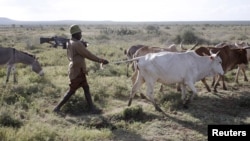Ranch owners in Kenya’s Laikipia County, a plateau and home to some of the largest ranches and conservancies in the country, are living in constant fear following a several attacks by armed pastoralists.
According to witnesses, cattle herders equipped with AK-47 rifles, spears and poisoned arrows have been moving around the county, targeting fenced-in properties. The attackers have destroyed homes, maimed animals and burned lodges.
The attacks have escalated in recent months, leaving at least a dozen people dead and sparking an outcry for greater government intervention.
The most recent victim was Tristan Voorspuy, a British army veteran shot dead on March 6 as he tried to inspect some lodges that were burned by attackers two days before. His body was found lying next to his injured horse.
Following the incident, Kenya’s minister for internal security, Joseph Nkaissery, told VOA’s Swahili service that the head of the country's criminal investigation directorate had been sent to the area to lead the investigation.
“Already, 379 illegal grazers have already been arrested,” said Nkaissery. He said the government is in the process of “identifying and removing” all the invaders, but hastened to add that “we have to do it humanely.”
Drought only part of the problem
The government attributes the situation to the regional drought, which it says is driving herders to seek new grazing lands for their cattle.Even in the best of times, Laikipia is a hot place, sitting right on the equator.
But some analysts say that approach is too simplistic and fails to address underlying issues.
“Short-term programs to address famine and drought do not guard against future invasions,” says Moses Wafula, a professor at Kenyatta University.
Initially, locals also thought that the attacks were a product of the drought. But the size and scope of the invasions have made many wonder if there is a connection to Kenya’s national elections, scheduled for August.
Some analysts say politicians may be inciting the herders, telling them that they have a right to the land because it belonged to their ancestors before British colonizers forcibly removed the Maasai pastoralist community from the Rift Valley and Laikipi in the early 20th century and sent them to the area now known as the Maasai Mara, near the border of Kenya and Tanzania.
“The violent land invasions are being stoked by politicians seeking votes from particular ethnic blocs,” says Sarah Korere, who is running for a parliament seat for Laikipia North.
Banditry
Kenyan President Uhuru Kenyatta seems to agree, based on comments in his state of the nation address to parliament on Wednesday.
“We are still confronted by lawlessness and violence in the form of banditry in parts of the North Rift [Valley] and Laikipia,” he said. “…I take this opportunity to warn politicians in the affected areas to stop incitement to all forms of violence.”
Kenyatta said his administration will use “all means at our disposal” to pursue and bring to justice the perpetrators.
For now, many ranchers say the government is not doing much to help them.
Maria Dodds, the manager of Kifuku Borans cattle ranch, which has experienced several raids, says she has been playing cat-and-mouse games with the illegal herders.
“They cut my fence and we embarked on using stones, arranging them to provide a compact fence. They, of course, come and remove the stones, one at a time,” she says.
John Kariuki, a Kenyan political analyst, says concerted efforts are required to guarantee the protection of private property, ensure equitable access to natural resources, and create a long-term strategy to help locals cope with the effects of droughts.
“Unless the powers that be address issues like corruption, policy, security, management of resources and development within rural areas, this conflict will continue,” he said.




